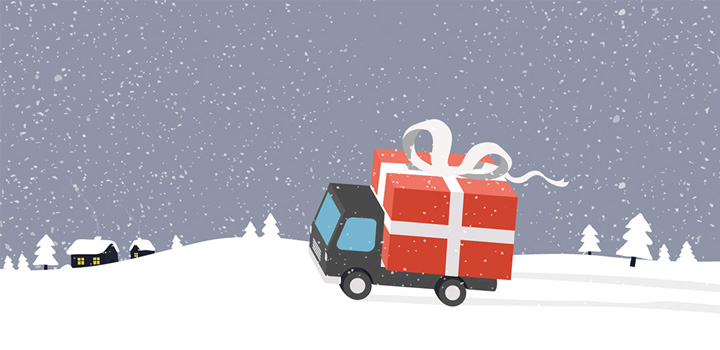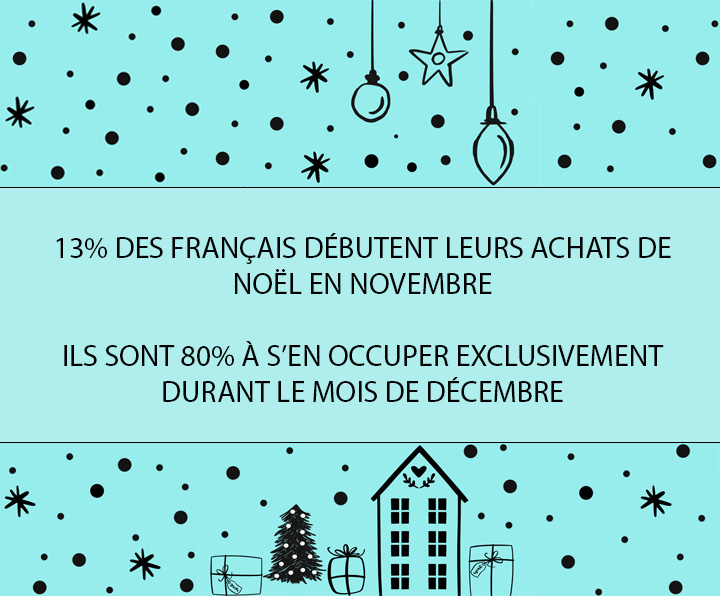
Statistics and facts to prepare your e-commerce for Christmas
Did you know that an overwhelming majority of French people prepare Christmas on the Internet? And that the 7 days before Christmas week are the best sales days of December?
Every year, as the holiday season approaches, the shopping season is in full swing! For most e-tailers, this period is systematically the most profitable of the year.
But how will online sales for Christmas 2021 pan out? And what consumer trends can be predicted?
To answer these questions, here is a compilation of facts and statistics about online shopping habits during the holiday season that should help you make strategic decisions to prepare your e-commerce for Christmas.
5 key e-commerce statistics for Christmas 2021
1 – Sales volume and e-commerce turnover at Christmas

87% of French cyber shoppers use the web to prepare for Christmas. Of these, 80% buy their gifts online.
In November and December 2021, the growth in online shopping seen for several years during the holiday season will continue.
In France, during these two months, the turnover generated by e-commerce should reach 26.6 billion euros (+13.8% compared to last year), which is more than 20% of total annual sales on the Internet. The French are expected to spend almost 70 billion euros on Christmas.
And this upward trend does not stop at France’s borders. It is also observed in North America and in 7 other European countries, where online sales during the period from Black Friday to Christmas also increase significantly each year.
E-retailers with physical outlets are among those who should benefit most from this growth. In fact, 47% of consumers plan to visit a store to see a product they intend to buy later on the web.
2 – Key dates for online Christmas shopping

13% of French people start their Christmas shopping in November, while 80% do it during December.
Every year, the buying habits of online shoppers change, while e-retailers work hard to offer services that improve the customer’s shopping experience, particularly in terms of delivery times.
This makes it difficult to predict when online shoppers are most likely to convert.
However, it is not risky to take Black Friday as the starting point for Christmas sales.
” Black Friday and Cyber Monday have established themselves in a very short time as must-attend events for consumers, on par with sales.”
Marc Lolivier, General Delegate of FEVAD
This is when the traffic starts to exceed the expectations of a normal weekend. With this event, online shoppers are starting to identify, plan and purchase the gifts they will put under the tree.
So if you are preparing your e-commerce for Christmas, do it in a way that takes into account this early interest.
Discover also our digital strategy ideas for Black Friday
It is also possible to note that in the run-up to Christmas, a big wave of conversions takes place between December 14 and 18, about a week before the big day. This is a strategic deadline for orders to be received on time.
After that date, consumers are afraid of receiving their orders too late and are buying fewer products that need to be delivered. They then tend to turn to physical stores to buy the Christmas gifts they miss.
To reassure them, if you offer express delivery, don’t hesitate to highlight it on your website. Remind them of the deadline by which they can order on your e-commerce site to receive their package on time.
Moreover, various e-commerce statistics show that December 25 is not the last day on which sales are going well. While it’s a quieter day than most other days in December, it’s still busier compared to other “normal” days in the online business.
In fact, traffic peaks on Christmas Day and the day after… mainly because Internet users are looking for bargains!
So if you’re planning to implement discounts after the Christmas holidays, consider doing so as early as December 25.
3 – Distribution of the Christmas budget and types of gifts sought

Over 30% of orders placed on Christmas Eve are for intangible products
FEVAD and Médiamétrie consider that French cyber shoppers will use the majority of their Christmas budget to buy games/toys (40%), on a par with cultural products such as CDs or DVDs (also 40%).
The next most popular items are clothing, shoes and fashion accessories (32%), followed by cosmetics (29%) and high-tech products (19%).
While most people still prefer to put a “physical” gift under the tree, last-minute shoppers often have no choice but to fall back on products / intangible goods, and therefore to do their Christmas shopping on the Internet in order to find a gift before Christmas Eve.
As a result, in the two or three days before Christmas, a large number of online orders are for products that do not require delivery: gift cards, “experiences” (leisure, wellness, etc.), tickets/shows, travel, etc.
To attract the attention of these latecomers who missed the delivery, highlight on your e-commerce site your gift card offers and products free of shipping.
4 – Expectations of online shoppers at Christmas

64% of French people prefer to do their Christmas shopping online to avoid the crowds in stores.
In the run-up to December 25, even more than during the rest of the year, e-commerce is popular with shoppers because it allows them toavoid crowds and queues in stores while saving travel time.
It’s not surprising then that home delivery remains the preferred shipping method for 76% of the French. In this sense, express delivery is a real asset for e-commerce in that it allows latecomers to receive their orders in time to place them at the foot of the Christmas tree on D-day.
For 25% of online shoppers, the possibility of same-day delivery is very important during the Christmas period.
63% of online shoppers prefer to have their goods delivered to a relay point, but in-store collection is not outdone, as 32% of consumers choose to buy online and then collect their order in-store.
The “click and collect” trend is therefore set to gain momentum this year. According to a study by Adobe Digital Insights, usage has more than doubled since January 2020 (119% growth), and nearly half of those surveyed consider in-store pickup the best way to get last-minute gifts.
Other advantages of online shopping motivate shoppers to do their Christmas shopping on the web: the possibility to compare prices and find promotional offers, convenience, but also variety of choice.
The holiday season is particularly competitive, so you must redouble your efforts to respond to increasingly demanding customers and convince them that they will get the best deal by buying on your e-commerce site.
Compare your prices with those of your competitors, and don’t hesitate to set up special Christmas promotions or offer gift cards.
5 – Breakdown of Christmas sales by device

Purchases on mobile (smartphone and tablet) accounted for €6.860 billion for Christmas 2018, compared to €7 billion on PC.
Although online shoppers are increasingly using a mobile device to prepare for Christmas, tablets and mobiles are still mainly used for advisory purposes (browsing and searching for gifts).
In 2021, nearly 42% of total Christmas sales are expected to come from a mobile device; therefore, the majority of online transactions still take place on computers.
When it comes to how consumers buy on mobile, apps are twice as likely to convert as the traditional web. This higher conversion is correlated with 2.4 times faster speed, ease and fluidity of payment, as well as better content relevance.
Other devices and media are also beginning to make their way into online commerce.
Even if the phenomenon is not yet overwhelming in France, on the other side of the Atlantic it is emerging. In the United States, smart speakers, such as Google Home or Amazon Echo, are starting to become ubiquitous: 32% of the American population has a voice assistant.
Also find out how to optimize your site for voice search
Even if users of these IoT devices don’t yet have the reflex to use them to place orders at Christmas, they help them make purchasing decisions.
Nearly half of them say they have searched for products via their smart speakers, 43% have used them to create shopping lists and 32% to compare prices. But, only 25% say they use their voice assistant to shop online.
Did you like this article?
Subscribe to our newsletter and you will receive our other articles once a month in your mailbox









Leave a Reply
You must be logged in to post a comment.